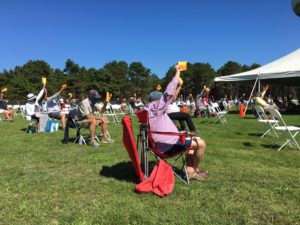WELLFLEET — Standing on the pitcher’s mound at the Wellfleet Elementary School ballfield, Moderator Dan Silverman pitched a no-hitter on Sept. 12, with voters approving all the articles that came before them at the town’s pandemic-inspired outdoor annual town meeting.
The crisp and sunny weather may have helped bring out 200 voters, double the reduced-because-of-Covid-19 quorum of 100. Many voters looked like they were in a witness protection program, with hats, sunglasses, and masks. But they sat far apart and got the business of town government done in just under four hours.
The sound system worked well, and voters were able to stay in their seats to ask questions by beckoning “microphone wranglers,” posted throughout the outfield with microphones on selfie sticks.
All the articles on the warrant were adopted, with the exception of those that were indefinitely postponed for various reasons, including the fact that four did not survive a Proposition 2½ override ballot on Sept. 8. Those were: a new police cruiser for $50,000; a fire command vehicle for $55,000; a public works backhoe for $168,000; and a new transfer station guard shack and canopy for $55,000.

Six budget overrides were approved both at the ballot and at town meeting. The most costly was for borrowing up to $3.8 million to replace a water main for the town’s secondary public water source. Jim Hood, chair of the water commissioners, said the town hopes to receive “a substantial portion” of the cost in grants.
The water main upgrade is to fulfill the state requirement for a secondary or backup system should the first fail. Wellfleet’s primary water source, the Boy Scout Camp wellfield near the Council on Aging, pumps more than enough water for the town’s current peak use: 100,000 gallons daily. Current peak daily use is just over 63,000 gallons. But the secondary water source on Gristmill Way uses a four-inch main that can handle only 40,000 gallons a day.
By replacing that with an eight-inch pipe, the neighborhoods of Old Hay Road, part of Route 6, and Briar Lane would also get access to town water. This could add 80 customers in all to the municipal system, including some on Briar Lane that do have water quality problems, Hood said. And since the water system is funded by user fees, additional hookups help spread the cost.
Lastly, an additional 9,000 gallons a day will be needed if the town is able to construct a proposed 46-unit affordable housing complex on Lawrence Road. Though this is within the capacity of the primary system, it would further tax the secondary system.
Select board member Helen Miranda Wilson said she didn’t like that proponents were unnecessarily tying the affordable housing project to the water main or that they were “recruiting” users to help pay for the water system.
“Hooking up people who don’t need water is environmentally a very bad idea,” Wilson said. “Groundwater is our most precious resource.”
Kathleen Bacon, a former select board member, said town meeting voters were actually sitting on top of the proposed affordable housing complex’s septic system. Tying the water to the housing project is a way to secure a state grant for the water expansion, she added. The necessary override for the project passed at the Sept. 8 election, 501 to 239.
Town meeting voters also agreed to hire two new firefighter-paramedics, which will allow the fire dept. to have three people on each shift for 24-hour coverage, said Fire Chief Richard Pauley. The $148,000 for salary and benefits is a permanent tax increase and will cost the owner of a $538,524 home $35.12 a year. It passed at the ballot, 460 to 280.
Voters also approved $110,000 to engineer a sprinkler system at the Wellfleet Elementary School. Somehow, Pauley explained, sprinklers were not included in a major school renovation in the early 1990s, although legally required. “Someone waived that requirement and it should not have been done,” Pauley said.
There was some debate about two petitioned articles, one a ban on the sale of single-use plastic water bottles, and the other a nonbinding referendum to change the state seal, which features a Native American image topped by a colonial swordsman’s disembodied arm.
Justina Carlson and Mike DeVasto, both select board members, said the ban on water bottles, which will go into effect on Sept. 1, 2021, encourages the use of carbonated beverages and Gatorade. People with jobs outside or on the water need to stay hydrated and may not be prepared for this ban.
“I think behavior shouldn’t be legislated,” said Carlson.
Carlson also argued against a petition to change the state seal. Though her own great-great-grandmother was “a full-blooded Cherokee Indian,” she said, she was not in favor of the “erasure of history.”



